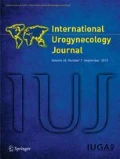Abstract
The massive introduction of new products from device and drug industries together with a scanty device approval process and a growing scepticism about the reliability of drug trials call for new improved strategies in urogynaecological research. Device companies and physicians have a mutual ethical responsibility of contributing to create clinical data based on the framework of trials in surgery before new surgical products are implemented and disseminated. In respect of the patients’ altruism and confidence, which make drug trials possible, the industry and academia have an obligation to conduct and report clinical results in accordance with the highest standards of scientific and ethical integrity.
Similar content being viewed by others
References
Abrams P, Cardozo L, Khoury S, Wein A (2005) Research methodology, vol 1, Chapter 3. 3rd International Consultation on Incontinence. Health Publication Ltd, Plymouth (Incontinence)
Walters MD (2003) The use and misuse of prosthetic materials in reconstructive pelvic surgery: does the evidence support our surgical practice? Int Urogynecol J 14:365–366
Petri E, Kölbl H (2004) Eminence, or rather eloquence, or rather economy-based medicine? Int Urogynecol J 15:147–148
McCulloch P, Taylor I, Sasako M, Lovett B, Griffin D (2002) Randomised trials in surgery: problems and possible solution. BMJ 324:1448–1451
Black N (1996) Why we need observational studies to evaluate the effectiveness of health care. BMJ 312:1215–1218
Lose G, Ostergard DR (1999) Medical technology assessment and surgery for stress incontinence. Int Urogynecol J 10:351–352
Lilford R, Braunholtz D, Harris J, Gill T (2004) Trials in surgery. Br J Surg 91:6–16
De Angelis C, Drazen JM, Frizelle FA et al (2004) Clinical trial registration: a statement from the international committee of medical journal editors. N Engl J Med 351:1250–1251
Moynihan R (2003) Who pays for the pizza? Redefining the relationships between doctors and drug companies. 1: Entanglement. BMJ 326:1189–1192
Korn D, Ehringhaus S (2006) Principles for strengthening the integrity of clinical research. PLOS Clin Trials 1(1):e1, May 2006
Lexchin J, Bero LA, Djulbegovic B, Clark O (2003) Pharmaceutical industry sponsorship and research outcome and quality: systematic review. BMJ 326:1167–1170
Gøtzsche PC (2005) Uafhængig klinisk interventionsforskning er meget påkrævet. Ugeskr Læger 167:1491–1494
Herbison P, Hay-Smith J, Ellis K, Moor K (2003) Effectiveness of anticholinergic drugs compared with placebo in the treatment of overactive bladder: systematic review. BMJ 326:841–844
Landis JR, Koplan S, Swift S, Versi E (2004) Efficacy of antimuscarinic therapy for overactive bladder with varying degrees of incontinence severity. J Urol 171:752–756
Hilton P (2007) Of porcupines and poodles—a joint challenge to industry and the profession. Int Urogynecol J 18(1):3–11
Dietz HP (2007) Bias in research and conflict of interest: why should we care? Int Urogynecol J Pelvic Floor Dysfunct 18(3):241–243. DOI 10.1007/s00192-006-0236-1
Fontanarosa PB, Flanagin A, DeAngelis CD (2005) Reporting conflicts of interest, financial aspects of research, and role of sponsors in funded studies. JAMA 294:110–111
Ehringhaus S, Korn D (2006) Principles for protecting integrity in the conduct and reporting of clinical trials. AAMC, 1–7 http://www.aamc.org/research/clinicaltrialsreporting//clinicaltrialsreporting.pdf March 2006
Martinson BC, Anderson MS, de Vries R (2005) Scientists behaving badly. Nature 435(9):737–738
Author information
Authors and Affiliations
Corresponding author
Rights and permissions
About this article
Cite this article
Lose, G. Urogynaecological research: current and future developments. Int Urogynecol J 18, 599–601 (2007). https://doi.org/10.1007/s00192-007-0318-8
Received:
Accepted:
Published:
Issue Date:
DOI: https://doi.org/10.1007/s00192-007-0318-8




